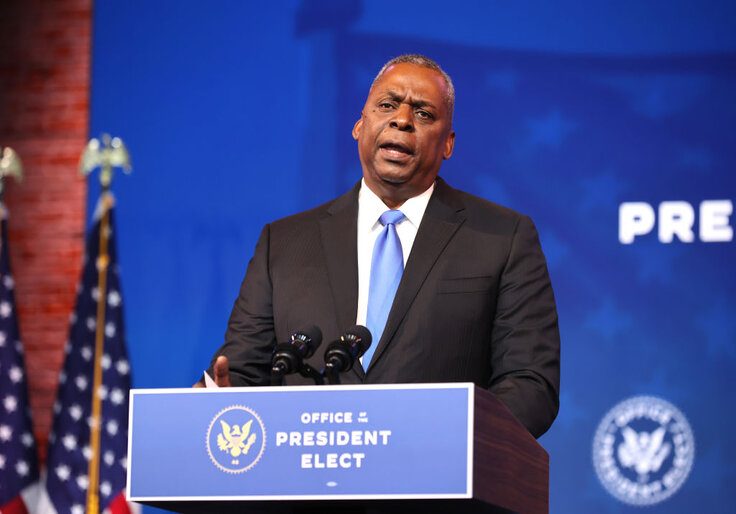Joe Biden's Pentagon pick, retired Army general Lloyd Austin, faced bipartisan criticism in 2016 for manipulating intelligence to downplay the threat of ISIS.
Two congressional probes—one by Republicans and another by Democrats—separately concluded that the U.S. Central Command (CENTCOM) suppressed intelligence briefings to paint a more optimistic picture of the fight against ISIS under Austin's leadership.
The Democratic investigation, led by Rep. Adam Schiff (Calif.), concluded that new rules set up under Austin's command were "insufficiently accommodating of dissent" and "did produce more optimistic assessments of [Iraqi Security Force] strength relative to [ISIS's]." The Republican report found that, according to an internal agency survey, 40 percent of CENTCOM intelligence analysts testified that "they had experienced an attempt to distort or suppress intelligence in the past year."
Austin, CENTCOM commander from 2013 to 2016 and Biden's pick for defense secretary, publicly claimed that the Obama administration was making "significant progress" against ISIS in fall 2014—just when the terrorist organization was reaching its largest territorial extent. Austin also told Congress that ISIS "is losing this fight" in March 2015, two months before terrorists captured Ramadi, a key city just miles from Baghdad.
The Department of Defense inspector general ultimately cleared CENTCOM commanders of politicizing the battle against ISIS, but its 2017 report noted, according to witnesses, Austin had pushed his subordinates to paint a rosy picture of the situation. The witness accounts are consistent with contemporary news accounts, which found that CENTCOM officials regularly altered language in intelligence reports.
"Several witnesses asserted that GEN Austin did not like to receive bad news from his staff regarding USCENTCOM's counter-[ISIS] campaign," the report read. "These witnesses believed that GEN Austin was the source of pressure to present a rosier picture of the effects of USCENTCOM's operations against [ISIS]."
Biden has made Austin's role in the fight against ISIS a central argument for his confirmation.
"Above all, I chose Lloyd Austin as my nominee for secretary of defense because I know how he reacts under pressure," the president-elect wrote in a Tuesday op-ed. "He designed and executed the campaign that ultimately beat back ISIS."
The general's anti-ISIS track record is spottier than Biden lets on. Under Austin, the United States' Middle-Eastern command shook up its intelligence-gathering operations—changes that hindered the fight against ISIS. According to the three probes (the two by Congress and one by the inspector general), analysts said those reforms at best slowed down intelligence processing and at worst introduced political interference into their assessments.
The probes started in the aftermath of a 2015 whistleblower complaint that accused CENTCOM of manipulating its assessments to paint an unduly positive picture of the situation.
The Republican investigation concluded that CENTCOM's leadership environment "deteriorated significantly" after Austin took over in 2013. Dozens of analysts viewed the leadership as "toxic," according to an internal survey. The survey also found widespread dissatisfaction with leadership's decision to introduce additional bureaucracy into the intelligence-production process, which analysts said led to delays and opportunities for distortion.
"These [intelligence] products also consistently described U.S. actions in a more positive light than other assessments from the IC and were typically more optimistic than actual events warranted," the report read.
Democratic investigators said that the new rules imposed under Austin "created an overly insular process for producing intelligence assessments" that tanked morale, delayed intelligence production, and failed to accommodate dissent.
Austin denied that he nudged his subordinates, but 42 intelligence analysts—nearly half of all those interviewed by the inspector general—said that CENTCOM leadership had distorted intelligence assessments by imposing a narrative or requiring a higher burdens of proof and greater sourcing for bad news.
The inspector general ultimately concluded that a series of miscommunications between Austin and CENTCOM leadership on one hand and the rank-and-file on the other unintentionally created the widespread "perception of distortion" among analysts, leading to self-censorship.
The Biden transition team did not respond to a request for comment.
